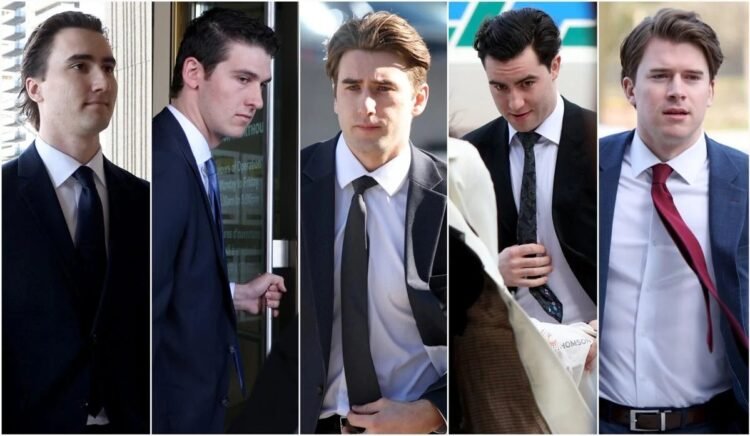LONDON, ONTARIO — The high-profile sexual assault trial involving five former members of Canada’s 2018 World Junior hockey team has entered its final stages, as defence lawyers rested their case Monday without calling further testimony.
Michael McLeod, Carter Hart, Alex Formenton, Dillon Dube, and Callan Foote — all prominent young players at the time — have pleaded not guilty to charges of sexual assault stemming from an alleged group encounter with a 20-year-old woman in a London hotel room in June 2018.
Only one of the accused, NHL goaltender Carter Hart, took the stand in his own defence. His testimony came after prosecutors concluded their case last week. Lawyers representing the remaining four defendants opted not to call witnesses, relying on prior police statements and minimal additional input — including a brief appearance by a London police detective called by Formenton’s counsel.
The case, now being heard by a judge alone following the dismissal of two separate juries, is set to resume next Monday with closing submissions.
A Night Under Scrutiny
According to the Crown, the alleged assault occurred in McLeod’s hotel room during team celebrations marking their recent gold-medal win. The complainant, identified only as E.M., testified that after meeting the players at a local bar, she had consensual sex with McLeod but was later subjected to non-consensual acts by other teammates who entered the room — allegedly after being invited via group chat.
E.M. described being intoxicated, naked, and frightened as unfamiliar men entered the room. “I went on autopilot,” she told the court, explaining how she complied out of fear and confusion.
Hart, however, offered a different account. He claimed E.M. appeared to be initiating encounters and said he asked for oral sex because he did not want to have intercourse. He described the experience as “brief” and “weird,” adding that E.M. seemed frustrated the others weren’t engaging.
Crown prosecutor Meaghan Cunningham pressed Hart during cross-examination, questioning his assumption that the group text implied consent. “You were putting a lot of faith in your friend, Mr. McLeod, to set something up that was morally acceptable to you,” she said.
Hart agreed that he had interpreted the situation based on McLeod’s lead.
Competing Narratives
Defence lawyers sought to challenge the complainant’s credibility, suggesting she was more sober than she claimed and had been actively encouraging the group. They alleged she came to the room seeking a “wild night” and had a “clear agenda” during the trial.
E.M. forcefully rejected these assertions under cross-examination, insisting she was manipulated, coerced into staying, and exploited while in a vulnerable state. “They could see I was out of my mind,” she said.
Closing Stage
With no more witnesses to be heard, the trial now shifts to its final phase. The judge will begin hearing closing arguments next week — the culmination of a deeply contentious case that has shaken Canadian hockey and reignited national debate over consent, power, and accountability in sports culture.

 English
English



























































